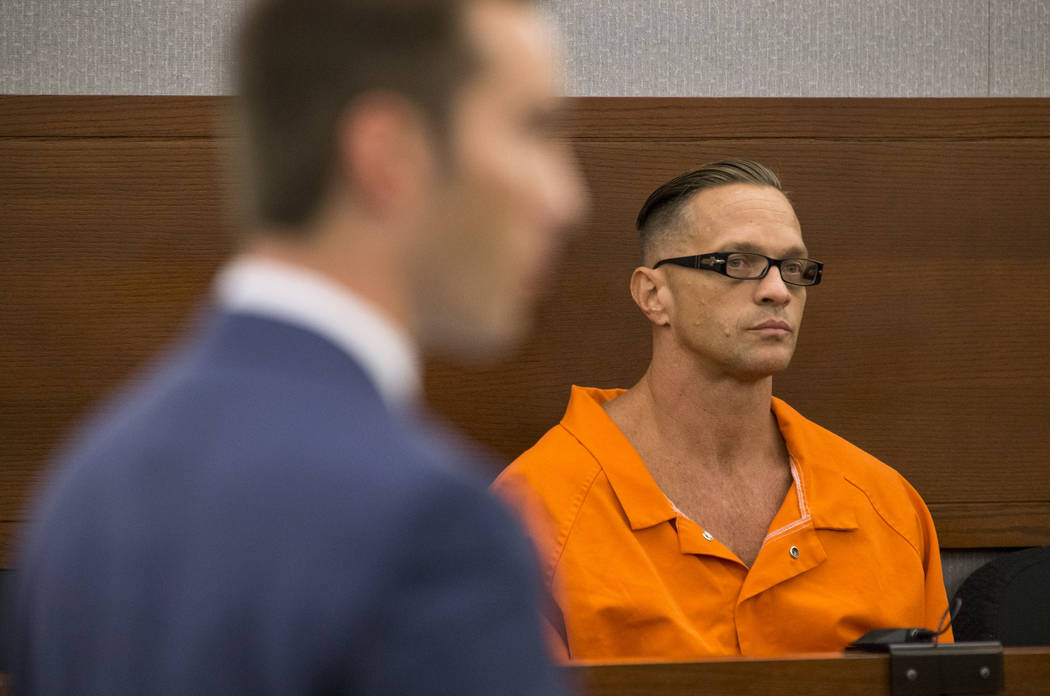Lawyers: Dozier lacks ‘basic human needs’ on Nevada’s death row
Defense lawyers say condemned killer Scott Dozier has deteriorated in the darkness of prison as he waits for his death wish to be granted.
Twice after orders from Las Vegas judges delayed his execution, he was placed in an isolated cell and was closely monitored for potential suicide.
He’s since returned to isolation in an infirmary at Ely State Prison, where he has been on death row for more than 11 years after being convicted of two murders.
The conditions of seclusion, which lasted up to 29 days at a time, were so extreme that his lawyers have asked a federal judge to tell the Nevada prison director to stop the practice.
In court papers filed recently in Reno, federal public defenders representing Dozier wrote that he had been deprived of “basic human needs.”
A prison spokeswoman declined to comment on the litigation.
Dozier’s execution was halted in July, for the second time in nine months, after a drug company sued the prison system, saying that its sedative had been obtained by the Nevada Department of Corrections through subterfuge. Dozier would be the first prisoner executed in Nevada since 2006.
The inmate, who waived his appeals in late 2016, was sentenced to die in 2007 after first-degree murder and robbery convictions in the killing of Jeremiah Miller. Dozier had a murder conviction in Arizona before he was brought to Nevada to face charges in Miller’s death.
As recently as October, Dozier was stripped of his prison-issued clothing, except for underwear and a tank top, and was forced into a cell with only a mattress and an anti-suicide blanket — one that could not be torn, his attorneys said. He was confined to the unit without exercise time and was denied eyeglasses, medicine, books and mail. For four days, he was unable to shower because he had not been offered a towel.
“His confinement had become intolerable and was having serious and negative effects upon his psyche,” the lawyers wrote in a motion for a temporary restraining order.
Occasionally, the lawyers wrote, Dozier also was denied legal calls, while prison officials confiscated his legal research and “privileged documents” from his attorneys, as a separate fight over Nevada’s supply of drugs made its way to the state’s Supreme Court.
“Dozier was confined in these conditions, with the front door locked and in almost total darkness, for 24 hours a day,” defense attorneys Lori Teicher, David Anthony and Timothy Payne wrote. “Inexplicably, (Ely State Prison) staff witnessed this deterioration while citing Mr. Dozier’s potential for self-harm as the basis for justifying his continued confinement.”
He is represented by the same federal public defenders who sought to ensure that his execution be carried out humanely. The effort ultimately led to a delay in November 2017.
Later that month, Dozier was sent to a segregated 23-hour lockdown unit and was denied recreation time, while other prisoners could “intermingle and socialize,” according to his lawyers. The lawyers wrote that Dozier’s medical care and mental health needs have been neglected and that they noticed a change in his physical appearance.
Prison staff “berated and accused him of being dishonest and a narcissist, have told him they are unwilling to believe anything he says, and have noted that they are ‘done with him,’” the defense document states.
During a no-contact visit on Oct. 11, “Dozier appeared to be in a dire emotional state, intermittently crying, cowering as the nearby guards watched over, and interacting with counsel in an uncharacteristically despondent manner,” according to the filing. “Physically, Mr. Dozier was unkempt and unshaven and appeared sleep deprived.”
Twelve days later, his lawyers noticed cuts on his neck and wrist that Dozier said were self-inflicted. He complained of sleep deprivation and pain in his shoulder and hip.
The attorneys noted: “He seemed tired, unkempt, and haggardly.”
Contact David Ferrara at dferrara@reviewjournal.com or 702-380-1039. Follow @randompoker on Twitter.
RELATED
Could political wave end capital punishment in Nevada?
























